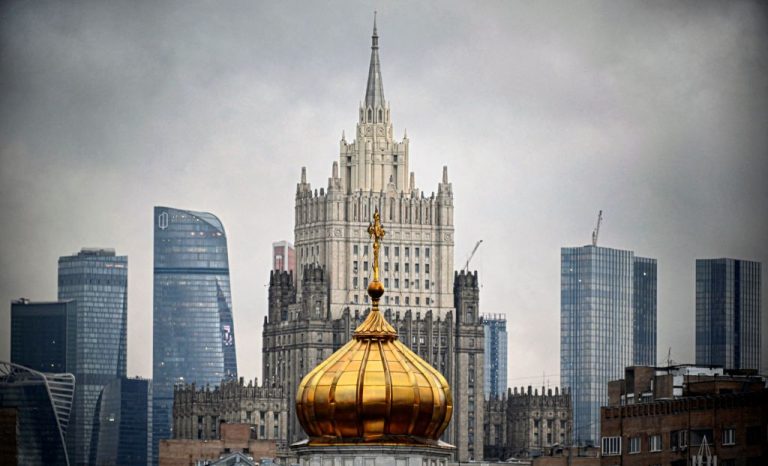The Russian Federation has arrested and charged a reporter with The Wall Street Journal for espionage, according to media reports.
Russia’s state media outlet TASS reported early in the morning of March 30 that 31-year-old Evan Gershkovich had been arrested by the Federal Security Service (FSB), which “thwarted” the man’s “illegal activities”—specifically, suspicions of “of spying in the interests of the American government.”
“It was established that Evan Gershkovich, acting at the request of the American side, collected information constituting a state secret about the activities of one of the enterprises of the Russian military-industrial complex,” the FSB was quoted by TASS as alleging.
In a follow-up article, Dmitry Peskov, spokesman for President Vladimir Putin, was paraphrased by TASS as stating that Gershkovich “was caught red-handed,” while Foreign Ministry spokeswoman Maria Zakharova was paraphrased as stating the man’s “activities are not journalism-related.”
A third TASS article published 12 hours after the original stated that Gershkovich more specifically was trying to dig up dirt on military facilities in Yekaterinburg, specifically one called “Novator.”
Success
You are now signed up for our newsletter
Success
Check your email to complete sign up
The alleged information came from Sverdlovsk Deputy Vycheslav Vegner, said to have been interviewed by Gershkovich, who also wanted to know about Vegner’s communications with Yevgeny Prigozhin, the founder of the Wagner Group, a private mercenary company operating in Ukraine alongside the Russian military.
Wagner Group is widely reported to be inflicting devastating losses on the NATO-backed Ukrainian Armed Forces in its siege of the city of Bakhmut.
According to an article on the arrest by the New York Post, Prigozhin stated in his personal Telegram channel, “I am not aware of Evan Gershkovich’s detention in Yekaterinburg,” and added that perhaps, “If you want, I could check the torture cellar in my house — to see if he’s there.”
“Among the American journalists, scores of whom I am keeping in there, I have not spotted him,” Prigozhin continued, and added further, “I could, if you want, check the freshly dug graves of foreign journalists on the property outside my home. But if I’m not mistaken, we had not buried him there.”
The Post says that Gershkovich appeared in a Moscow court the same day.
A March 30 article published by the Wall Street Journal’s Editorial Board on the jailing of their reporter has denied the charges as “phony” and characterized the move as “escalat[ing] the Kremlin’s habit of taking Americans hostage, and it’s more evidence that Russia is divorcing itself from the community of civilized nations.”
The Journal confirmed that the FSB had “snatched” Gershkovich in Yekaterinburg “where he was on a reporting trip” as an accredited journalist.
“The Journal denies the allegation, which is dubious on its face. The government closely monitors foreign reporters in Russia, and Mr. Gershkovich has worked there for years. The FSB could have expelled him long ago if it really believed he is a spy,” stated the Board.
As of time of writing, comments on the situation from the core of the U.S. government, such as Secretary of State Antony Blinken or President Joe Biden, are conspicuously absent from official channels.
Instead, The White House published a very brief statement issued by Press Secretary Karine Jean-Pierre on its website, where Jean-Pierre said the administration is “deeply concerned by the troubling reports,” calling the arrest “unacceptable,” and noting they “condemn” both the detention and Russia’s “continued targeting and repression of journalists and freedom of the press.”
However, Secretary Blinken was quoted by the Journal in a secondary article as stating, “In the strongest possible terms, we condemn the Kremlin’s continued attempts to intimidate, repress, and punish journalists and civil society voices.”
Nonetheless, CNN reported that the State Department “began tracking Gershkovich’s arrest Wednesday [March 29] afternoon before the news broke publicly,” based on comments from “two US officials.”
Despite the awareness of the situation, the U.S. government was unaware of Gershkovich’s arrest until it was informed by WSJ, a third unnamed official told CNN.
U.S. network media quickly sought to contain the story’s narrative. Time Magazine published an article titled “The Real Reason Russia Charged a WSJ Reporter” in a Google search, but has since been updated to “Russia’s Arrest of a Wall Street Journal Reporter Has More To Do With Geopolitics Than Espionage.”
Time cited a representative for Reporters Without Borders as stating the arrest is “a way for the Kremlin to intimidate the western journalists still reporting in Russia.”
“If western journalists can’t report on Russia any more, without being arrested without being suspected and accused of espionage, the country may become a black hole of information,” they added.
Time emphasized that Gershkovich’s “parents were Jewish immigrants who settled in the U.S. after leaving the Soviet Union,” the father from Odessa and the mother from St. Petersburg.
The magazine also revealed that Gershkovich had only worked for WSJ since 2022 and was previously employed for both The Moscow Times and European wire outlet AFP.
An examination of Gershkovich’s article history available on the Journal’s website shows many articles covering the Ukraine war, such as “Russia Makes a Habit of Harassing U.S. Planes, Pentagon Says, Artillery Shortage Hampers Russia’s Offensive in East Ukraine, Western Officials Say,” or “Fight for Bakhmut Becomes Moment of Truth for Wagner Founder.”
On March 8, Gershkovich co-authored an article on protests emerging in nearby Georgia, a partner of NATO titled “Georgia Rocked by Protests Over Russia-Style Foreign-Agents Bill.”
“Georgia’s Parliament on Tuesday evening gave initial backing to the law, which opponents say is inspired by similar Russian legislation and would require organizations receiving more than a fifth of their funding from abroad to register as foreign agents or face significant fines,” the authors wrote.
As of time of writing, the most recent updates on the case published on the TASS website quote Russia’s Ministry of Foreign Affairs as stating that Washington has yet to contact Moscow about Gershkovich’s detention.
Sergey Ryabkov, Deputy Foreign Minister, was quoted by TASS in another article as stating that a prisoner swap similar to one that led to the return of U.S. WNBA player Brittney Griner wasn’t on the table.
“I wouldn’t even consider this issue now, because people who were previously swapped had already served their sentences, including US citizens, who had quite serious offenses,” said Ryabkov, who characterized the imprisonment of other Russians in the United States as trapped in the “millstones of the American system of persecution.”
















